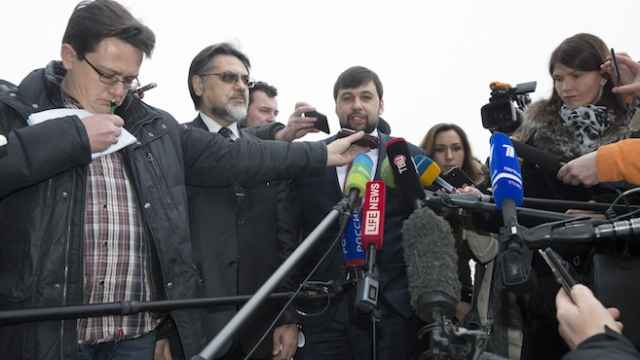Peace talks on Ukraine collapsed on Saturday after just over four hours with no tangible progress towards a new cease-fire but with Ukraine's representative and separatist envoys angrily accusing each other of sabotaging the meeting.
Ukraine's representative, former president Leonid Kuchma, left the talks in Minsk, Belarus, telling the Interfax news agency that separatist officials had undermined the meeting by making ultimatums and refusing "to discuss a plan of measures for a quick cease-fire and a pullback of heavy weapons."
Denis Pushilin, one of the separatist officials, told news agency RIA Novosti that they were ready for dialogue "but not ready for ultimatums from Kiev while shelling by their forces is going on in the background of towns in the Donbass (industrialized eastern Ukraine)."
The meeting of the "contact group," which also involves a Russian envoy and an official from the Organization for Security and Co-operation in Europe, took place in the Belarussian capital even as fighting between Kiev's forces and the Russian-backed rebels raged on in Ukraine's east, claiming more civilian and military lives.
The outcome dashed hopes that a new cease-fire could be put together soon to stem nine months of conflict pitting Ukrainian government forces against Russian-backed separatists who have declared "people's republics" in eastern Ukraine.
Shortly before the Minsk talks broke up, German Chancellor Angela Merkel, French President Francois Hollande and Russia's Vladimir Putin in a three-way phone call had expressed the hope the meeting would at least produce a cease-fire agreement.
More than 5,000 people have died since the conflict erupted last April following Russia's annexation of Crimea in response to the ousting of a Moscow-backed president in Kiev by street protests.
The conflict has produced the gravest crisis between Russia and the West since the Cold War, with the United States and the European Union imposing sanctions on Moscow because of what they say is incontrovertible proof that it is providing arms and men in support of the separatists. Moscow denies this is so.
Kuchma also reproached the two main separatist leaders in eastern Ukraine, who signed key agreements in Minsk last September, for failing to attend Saturday's follow-up meeting of the "contact group."
He said Kiev remained adamant that it wanted the separatists to honor agreements made in Minsk last September for a cease-fire as part of a 12-point blueprint for peace. Much-violated from the start, that truce collapsed completely with a new rebel advance last week.
Interfax quoted Kuchma as saying he awaited to hear Russia's reaction to the outcome soon.
//Widespread Violence
The September Minsk peace plan also called for tighter control of the joint Russia-Ukraine border, through which Kiev says Moscow is funneling fighters and equipment, and the freeing of prisoners held by the sides.
Much has changed on the ground, however, since September.
The separatists have set up self-proclaimed "people's republics," while their forces, which Kiev says are supported by 9,000 Russian regular troops, have seized more than 500 square kilometers (190 square miles) of territory beyond that agreed in the Minsk talks and threaten to seize control of the east's two main regions entirely.
Both sides have accused each other of deadly artillery and mortar strikes on civilian targets in the past two weeks, including on a cultural center in the main regional city of Donetsk on Friday that killed at least five people waiting for humanitarian hand-outs.
Heavy shelling continued on Saturday in Ukraine's eastern regions as the separatists sought to tighten a circle around government forces clinging on to control of the strategic rail and road junction of Debaltseve.
Regional police chief Vyacheslav Abroskin, in a Facebook post, said 12 civilians had been killed on Saturday by separatist artillery shelling of the town, which lies to the northeast of Donetsk.
Defense Minister Stepan Poltorak said 15 Ukrainian soldiers had been killed and 30 wounded in clashes across the east.
Debaltseve is on the main highway linking Donetsk and the other big rebel-controlled city of Luhansk and is also a vital rail link for goods traffic from Russia, which Kiev accuses of arming the rebels.
The rebels were also continuing to threaten Mariupol, a town of half a million in the southeast of the country on the coast of Sea of Azov, military spokesman Andriy Lysenko said.
A Message from The Moscow Times:
Dear readers,
We are facing unprecedented challenges. Russia's Prosecutor General's Office has designated The Moscow Times as an "undesirable" organization, criminalizing our work and putting our staff at risk of prosecution. This follows our earlier unjust labeling as a "foreign agent."
These actions are direct attempts to silence independent journalism in Russia. The authorities claim our work "discredits the decisions of the Russian leadership." We see things differently: we strive to provide accurate, unbiased reporting on Russia.
We, the journalists of The Moscow Times, refuse to be silenced. But to continue our work, we need your help.
Your support, no matter how small, makes a world of difference. If you can, please support us monthly starting from just $2. It's quick to set up, and every contribution makes a significant impact.
By supporting The Moscow Times, you're defending open, independent journalism in the face of repression. Thank you for standing with us.
Remind me later.





